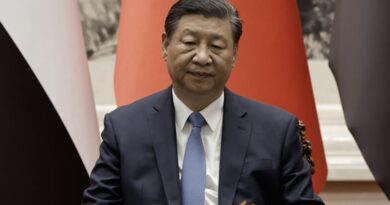‘Chinese money brokers based in Mexico have come to dominate international money laundering markets,’ U.S. prosecutors said.
A federal judge in Illinois has sentenced a Chinese national to 10 years behind bars for laundering $62 million in illegal narcotics proceeds on behalf of Mexican drug traffickers.
U.S. District Judge Sharon Johnson Coleman imposed the sentence on Dec. 12 after a hearing in federal court in Chicago, the U.S. Attorney’s Office in the Northern District of Illinois said in a
statement on Dec. 16.
Haiping Pan, 44, collaborated with accomplices to launder as much as $3 million monthly in drug proceeds using “secretive money pickups” in several U.S. cities, including Chicago, Los Angeles, and New York, followed by currency swaps between the U.S. dollar and Chinese yuan, and the Chinese yuan and Mexican peso, according to prosecutors.
The group carried out one to two pickups per week from 2016 to 2018, with each pickup amount ranging between $150,000 and $1 million, the prosecutors said.
Pan played a vital role in the scheme due to his expertise in international finance and relationships with either members or associates of Mexican drug cartels, the prosecutors said, and the proceeds were remitted to Mexican drug traffickers.
Pan, who prosecutors said facilitated the money transfers while living in the Mexican city of Guadalajara, was arrested in Mexico and extradited to the United States in 2022.
“The defendant was a significant part of a recent phenomenon in which a relatively small network of Chinese money brokers based in Mexico have come to dominate international money laundering markets,” prosecutors
said in a sentencing memorandum.
“Defendant’s crimes allowed his drug trafficking clients to secure the fruits of their pernicious trade faster, cheaper, and more securely than ever before.”
Pan was initially
indicted on one count of conspiracy to commit money laundering, one count of operating an unlicensed money-transferring business, and two counts of concealment of money laundering.
In 2023, Pan pleaded guilty to the conspiracy to commit money laundering, according to his plea agreement.
One of Pan’s coconspirators, Xianbing Gan, was
sentenced to 14 years in prison in April 2021. Another coconspirator, Huangxin Long, was handed a prison
sentence of 5 1/2 years.
In May, the Drug Enforcement Administration (DEA)
released its 2024 National Drug Threat Assessment, noting that Mexico-based Sinaloa and Jalisco cartels “rely on chemical companies and pill press companies in China to supply the precursor chemicals and pill presses” needed to manufacture synthetic drugs.
“Drug trafficking organizations based in Mexico and South America are increasingly utilizing China based underground banking systems as their primary money laundering mechanism,” DEA Administrator Anne Milgram said in a statement accompanying the
report.
In November, a grand jury in Los Angeles indicted
Hubei Aoks Bio-Tech Co. and four company officials, alleging that they sold controlled substances and chemicals used in manufacturing fentanyl in the United States from 2016 to 2023.
The chemical company, based in China’s Wuhan city, allegedly exported chemicals to at least 100 countries and advertised its products on several social media platforms, according to prosecutors.
Additionally, eight China-based companies and eight Chinese nationals were
charged with federal crimes related to trafficking synthetic opioids and fentanyl precursors in October.
The defendants “openly advertised their ability to thwart border officials,” used evasive tactics such as mislabeling the contents of shipments, and had shipped “a stable supply of precursor chemicals” to clients in the United States and Mexico for years, according to the Department of Justice.
In a
report published in February, the Congressional Research Service said that the Treasury Department had sanctioned more than 65 China-based or Hong Kong-based individuals for illicit fentanyl, xylazine, or nitazenes trafficking.
In July, the Treasury Department
announced sanctions against one Mexican resident and two Chinese nationals suspected of laundering drug-trafficking proceeds for the Sinaloa cartel.
The fentanyl crisis has devastated many American families and claimed many lives.
According to the Centers for Disease Control and Prevention, the number of fentanyl deaths was 74,702 in 2023, slightly down from 76,226 in 2022.





